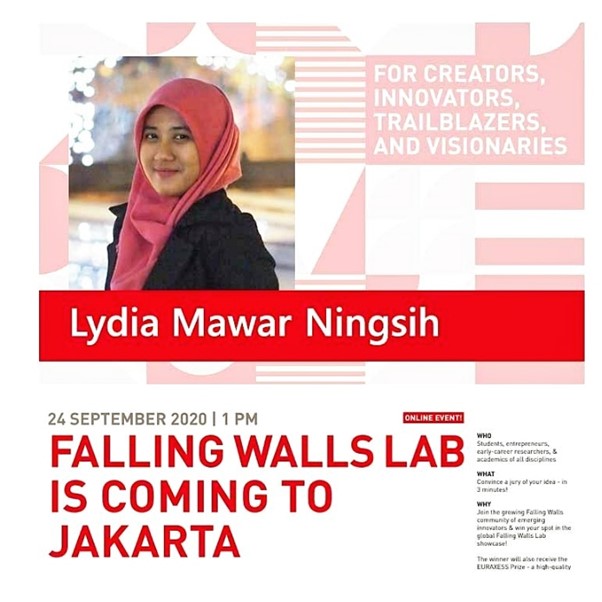Falling Walls Lab is an international forum for the next generation of early-career innovators, trailblazers, creators, and visionaries. Its aim is to promote exceptional ideas and connect promising scientists and entrepreneurs from all fields on a global level. Participants, also known as Labsters, are given the opportunity to present their research, business model, or initiative to peers, a high-calibre jury of experts from academia and business, and the general public.
Indonesia has the average of 84,000 tofu factories and around 90% are small scale industry called home industry. Usually, tofu produced using traditional technology, which currently experiencing environmental problems with respect to the inefficiency of resource usage and inadequate waste disposal. That’s because generally, tofu industries are gathered in one place in the middle of the settlement. In one place there are more than 100 industries, thatr’s why the industry is not able to treat the wastewater properly. Therefore, the tofu wastewater is commonly disposed into the environment without any treatment, causing bad odour and pollution of the surface, ground water and river. Tofu wastewater have high organic content with high value of BOD and COD content and that is the reason, why there is a high potential in utilizing this waste into the biogas.
Anaerobic digestion can be used for tofu wastewater treatment because the method produces biogas and at the same time reducing organic content. In this case we choose the simple technology to process communally used baffled anaerobic reactor with biofilter. The first step is the wastewater leading to the sedimentation area, then to the second area that uses biofilter filled with cow dung. In here, biofilter is used to hold the microorganism, so they cannot be easily carried away by the water currents. The last area is the effluent area, where biogas is already produced and ready to be captured and ready to be used. The biogas can be used as an alternative fuel for cooking and lighting, potentially also for generating electricity. It is very economically interesting, especially for the local residents.
This technology is focusing on small-scale tofu industry, which requires installation of waste treatment system which would be easy to use, have inexpensive operational cost, good economic value, and be environmentally friendly.
With this simple technology, tofu industry can be transformed into a sustainable green industry. Also, it can prevent the pollution to the environment, changing the habit of industry and people from dependency on fossil fuel and also help in reaching the goal of Indonesian government to contribute by 23% of renewable energy in 2025.


